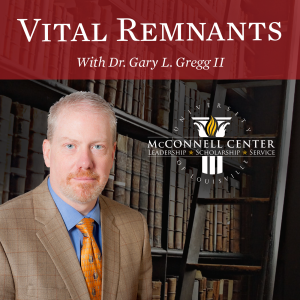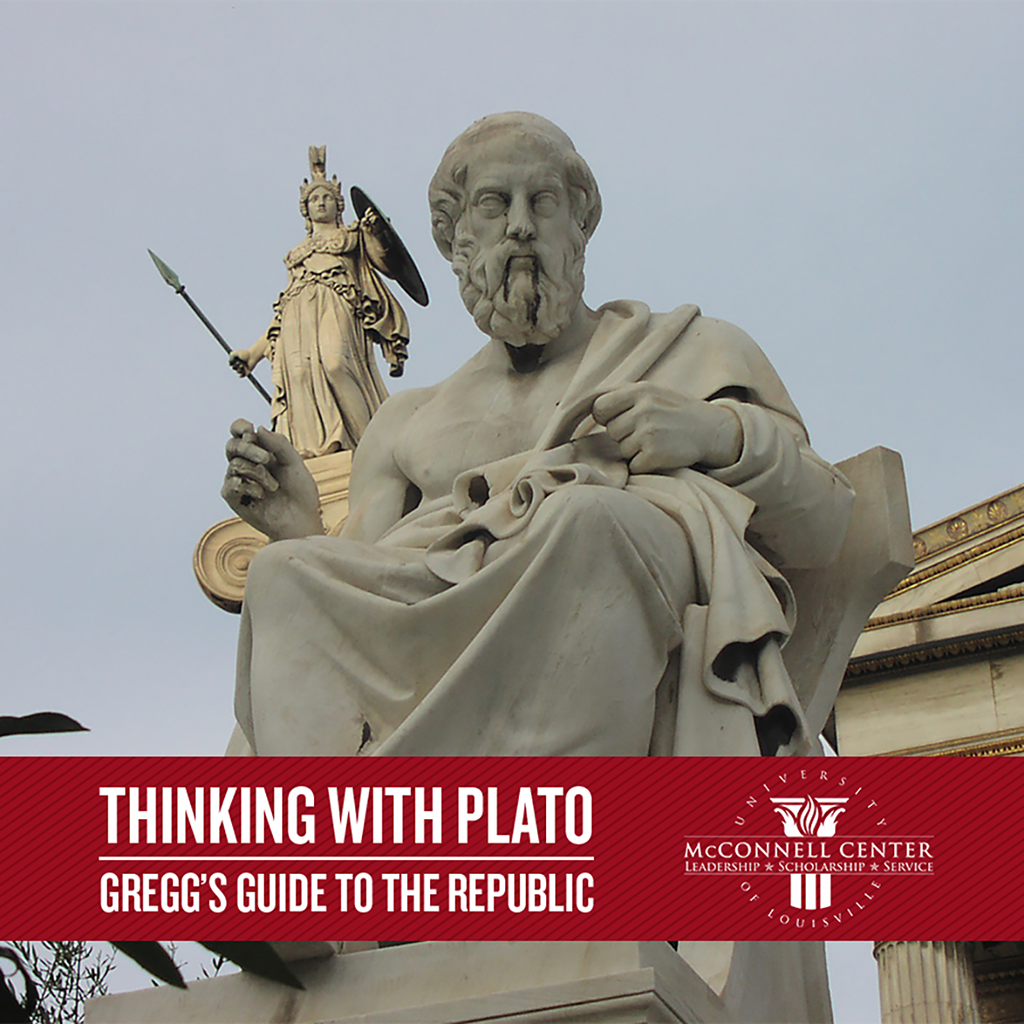

Episode List

1.1 Plato's Republic | Justice & Leadership
In this inaugural episode of our walk through Plato's Republic, Dr. Gary Gregg introduces listeners to the importance of "The Republic" and lays out a few key concepts of Platonic thought that will help inform the modern reader's understanding as they work through the text. He then walks through the various definitions of Justice presented throughout the dialogue and discusses the implications of each for both leadership and politics(20:00). The question of what is necessary to compel good people to rule is considered (36:15), followed by The "Ring of Gyges" story(46:00). He then recounts Adeimantus's assertion that society, culture and family influence our actions and shows how this contributes to the nature v. nurture argument (53:19). Dr. Gregg ends with an overview of what will be covered in Target 2 (55:47). Target 1 Reading: Book I and Book II through 367e, pp. 3-44 of "The Republic of Plato", 2nd edition, translated by Allan Bloom (Basic Books, 1968 and 1991). Download Dr. Gregg’s Guide to The Republic here Subscribe to our newsletter and receive McConnell Center updates directly in your mailbox Please share any thoughts, questions, comments, or concerns with us via email at connor.tracy@louisville.edu This podcast is a production of the McConnell Center at the University of Louisville. For more information, including upcoming events, please visit us online at mcconnellcenter.org or on social media at: Facebook: @mcconnellcenter Instagram: @ulmcenter Twitter: @ULmCenter Intro: Bridget Kim Host: Dr. Gary L. Gregg II Editor: Connor Tracy Music: Selected from http://freemusicarchive.org/music/Damiano_Baldoni/

1.2 Plato's Republic | The Education & Proper Political Culture for Leadership Part I
In the second episode of this season of Vital Remnants, Dr. Gary Gregg begins by comparing Plato’s philosophical assumptions about the origin of communities with those that have shaped the modern understanding, including the views of Hobbes, Locke and Rousseau (5:11). Gregg then dives into the creation of Plato’s city and discusses the origins of war (13:20), the need for guardians, and the question of who will guard against them. Plato’s metaphor of the “noble puppies” is examined along with the education of the guardian class (17:57). Other key topics include censorship (24:22), “The Noble Lie” (32:37), culture and corruption (34:28), music (44:01), and the very important relationship between politics and culture (47:40). Dr. Gregg ends with highlights of what will be covered in Target 3 (53:19). Target 2 Reading: Books II, III, & IV pp. 40-103 of "The Republic of Plato", 2nd edition, translated by Allan Bloom (Basic Books, 1968 and 1991). Download Dr. Gregg’s Guide to The Republic here Subscribe to our newsletter and receive McConnell Center updates directly in your mailbox Please share any thoughts, questions, comments, or concerns with us via email at connor.tracy@louisville.edu This podcast is a production of the McConnell Center at the University of Louisville. For more information, including upcoming events, please visit us online at mcconnellcenter.org or on social media at: Facebook: @mcconnellcenter Instagram: @ulmcenter Twitter: @ULmCenter Intro: Bridget Kim Host: Dr. Gary L. Gregg II Editor: Connor Tracy Music: Selected from http://freemusicarchive.org/music/Damiano_Baldoni/

1.3 Plato's Republic | The Education & Proper Political Culture for Leadership Part II
In this episode of Vital Remnants, Dr. Gary Gregg discusses Plato’s call for the combination of political power and philosophy within our leaders (1:34), the three parts of society (5:00), Plato’s tests for leadership (7:31), and the “Myth of the Metals” (15:41). He then revisits education (22:28), the four parts of virtue (26:07), Plato’s definition of justice (32:05) and the burden of leadership (36:31). Dr. Gregg concludes by examining the relationship between the virtues and the parts of society (38:03), how the parts of society correlate to parts of the individual soul (39:13), the tripartite soul (42:40), C.S. Lewis’s The Abolition of Man (50:57), and what all of this means for leadership today (54:35). Target 3 Reading: Books III, IV, & V, pp. 91-152 of "The Republic of Plato", 2nd edition, translated by Allan Bloom (Basic Books, 1968 and 1991). Download Dr. Gregg’s Guide to The Republic here Subscribe to our newsletter and receive McConnell Center updates directly in your mailbox Please share any thoughts, questions, comments, or concerns with us via email at connor.tracy@louisville.edu This podcast is a production of the McConnell Center at the University of Louisville. For more information, including upcoming events, please visit us online at mcconnellcenter.org or on social media at: Facebook: @mcconnellcenter Instagram: @ulmcenter Twitter: @ULmCenter Intro: Bridget Kim Host: Dr. Gary L. Gregg II Editor: Connor Tracy Music: Selected from http://freemusicarchive.org/music/Damiano_Baldoni/

1.4 Plato's Republic | The Philosopher Kings & the Responsibilities of Leadership
In this episode, Dr. Gary Gregg outlines Plato’s views on political leadership and uses this framework to consider today’s institutions and public figures. He walks us through the Allegory of the Ship and the famous Allegory of the Cave. Lastly, Connor Tracy joins Dr. Gregg to discuss Plato’s concept of the “Divided Line.” Target 4 Reading: Books V, VI & VII, pp. 153-220 of "The Republic of Plato", 2nd edition, translated by Allan Bloom (Basic Books, 1968 and 1991). Download Dr. Gregg’s Guide to The Republic here Subscribe to our newsletter and receive McConnell Center updates directly in your mailbox Please share any thoughts, questions, comments, or concerns with us via email at connor.tracy@louisville.edu This podcast is a production of the McConnell Center at the University of Louisville. For more information, including upcoming events, please visit us online at mcconnellcenter.org or on social media at: Facebook: @mcconnellcenter Instagram: @ulmcenter Twitter: @ULmCenter Intro: Bridget Kim Host: Dr. Gary L. Gregg II Guest & Editor: Connor Tracy Music: Selected from freemusicarchive.org/music/Damiano_Baldoni/

1.5 Plato's Republic | The Types of Political Leadership & the Types of Political Communities
Having now arrived at one of the most important sections of The Republic, Dr. Gary Gregg discusses Plato’s types of governments and how they decline from the best to the worst. Spoiler alert–democracy is certainly not the best in his view. Listeners are encouraged to consider Plato’s strong indictment of democracy and to take a hard look at our American system through this lens to see how closely we compare. Remember too that government is “man writ-large,” and therefore he is talking not only about the types of political regimes, but also–and quite possibly more importantly–the types of individual souls. Target 5 Reading: Book VIII, pp. 221-249 of "The Republic of Plato", 2nd edition, translated by Allan Bloom (Basic Books, 1968 and 1991). Download Dr. Gregg’s Guide to The Republic here Subscribe to our newsletter and receive McConnell Center updates directly in your mailbox Please share any thoughts, questions, comments, or concerns with us via email at connor.tracy@louisville.edu This podcast is a production of the McConnell Center at the University of Louisville. For more information, including upcoming events, please visit us online at mcconnellcenter.org or on social media at: Facebook: @mcconnellcenter Instagram: @ulmcenter Twitter: @ULmCenter Intro: Bridget Kim Host: Dr. Gary L. Gregg II Editor: Connor Tracy Music: Selected from freemusicarchive.org/music/Damiano_Baldoni/
You may also like
Create Your Podcast In Minutes
- Full-featured podcast site
- Unlimited storage and bandwidth
- Comprehensive podcast stats
- Distribute to Apple Podcasts, Spotify, and more
- Make money with your podcast












